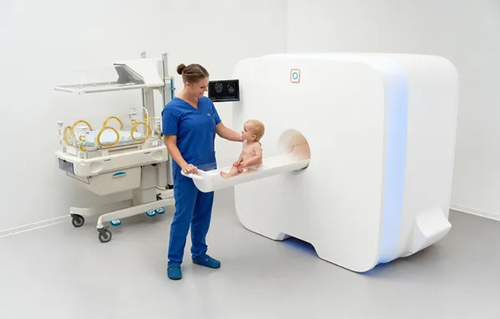NEWS
Meilenstein erreicht: Neoscan Solutions erhält CE-Zertifizierung für pädiatrisches MRT
Neoscan Solutions blickt auf eine rasante Erfolgsgeschichte zurück. Dr. Röll, der Geschäftsführer von Neoscan Solutions, gründete in 2017 durch die Initiative von Prof. Rose, dem Sprecher des Forschungscampus STIMULATE und Dr. Gerhold, dem Gründer der GETEC Unternehmensgruppe, das Medtech-Startup. „Für die dynamische Entwicklung des Unternehmens war die gemeinsame Projektarbeit mit der Otto-von-Guericke-Universität Magdeburg am Forschungscampus STIMULATE von entscheidender Bedeutung“ so Dr. Röll. Gemeinsam wurden Technologien für das Magnetsystem und dessen Steuerung erforscht.
Als Ergebnis steht nun weltweit zum ersten Mal ein MRT-System für Neugeborene und Kleinkinder bis zum sechsten Lebensjahr bereit, welches in beinahe jedem verfügbaren Raum, z. B. auf einer neonatologischen Station, betrieben werden kann. Die Schlüsselinnovation stellt dabei der Hochtemperatur(HTS)-Supraleiter dar, der für das klinische MRT das Hauptmagnetfeld erzeugt. Die HTS-Technologie erlaubt im Vergleich zu herkömmlichen MRT eine kompakte Bauweise mit wenig Gewicht und eine Kühlung ohne Helium, was die Installation des MRT-Systems in herkömmlichen Räumen ermöglicht, die dafür nicht speziell vorgesehen wurden. Während die nicht-invasive MRT-Diagnostik, die einen hervorragenden Weichteilkontrast liefert, für Erwachsene zu einem selbstverständlichen Standard geworden ist, stehen solche Untersuchungen für Neugeborene und Kleinkinder allzu oft nicht zur Verfügung. Bei den am meisten gefährdeten Patient:innen werden die riskanten und mühsamen Transporte zu einer MRT-Anlage, die sich oft weit entfernt von diesen Patient:innen befindet, vermieden. Darüber hinaus sind viele bestehende MRT-Anlagen durch die erwachsene Bevölkerung überlastet.
Mit dem ersten 1.5 Tesla pädiatrischen MRT „neo315“ will Neoscan Solutions diese Versorgungslücke schließen. Der Produktname "neo315" leitet sich von der 30 cm langen Patientenbohrung und der Feldstärke von 1.5 Tesla ab. Wir freuen uns, mit unserem Partner Neoscan Solutions, dass neo315 mit der erlangten CE-Zertifizierung gemäß der neuen europäischen Medizinprodukteverordnung (MDR) für den europäischen Markt verfügbar wird.
In der Projektarbeit waren auch Studierende der Otto-von-Guericke-Universität Magdeburg beteiligt. Die frühe Einbindung von Studierenden in unternehmerische Abläufe ist für alle Seiten bereichernd. Der Forschungscampus ermöglicht durch gelebte öffentlich-privaten Partnerschaften solche wertvollen Personal- und Expertisentransfers.
Weitere Infos zu Neoscan Solutions und zum pädiatrischen MRT-System neo315 erhalten Sie hier.

Milestone Reached: Neoscan Solutions Receives CE Certification for Pediatric MRI
Neoscan Solutions looks back on a rapid success story. Dr. Röll, the CEO of Neoscan Solutions, founded the medtech startup in 2017 through the initiative of Prof. Rose, the spokesperson of the Research Campus STIMULATE , and Dr. Gerhold, the founder of the GETEC group of companies. "The joint project work with Otto von Guericke University Magdeburg at the Research Campus STIMULATE was of crucial importance for the dynamic development of the company," says Dr. Röll. Technologies for the magnet system and its control were jointly researched.
The result is the world's first MRI system for newborns and infants up to the age of six, which can be operated in almost any available space, e.g. on a neonatal ward. The key innovation here is the high-temperature superconductor (HTS) that generates the main magnetic field for clinical MRI. Compared to conventional MRIs, HTS technology allows for a compact design with low weight and cooling without helium, which enables the MRI system to be installed in conventional rooms that were not specifically designed for this purpose. While non-invasive MRI diagnostics, which provide excellent soft tissue contrast, have become a standard of care for adults, such examinations are too often not available for neonates and infants. For the most vulnerable patients, this avoids the risky and cumbersome transports to an MRI facility, which is often located far from these patients. In addition, many existing MRI facilities are overburdened by the adult population.
With the first 1.5 Tesla pediatric MRI "neo315", Neoscan Solutions aims to close this gap in care. The product name "neo315" is derived from the 30 cm patient bore and the field strength of 1.5 Tesla. We are pleased with our partner Neoscan Solutions that neo315 will be available for the European market with the obtained CE certification according to the new European Medical Device Regulation (MDR).
Students from Otto von Guericke University Magdeburg were also involved in the project work. The early involvement of students in entrepreneurial processes is enriching for all sides. The research campus enables such valuable transfers of personnel and expertise through active public-private partnerships.
For more information on Neoscan Solutions and the neo315 pediatric MRI system, click here.